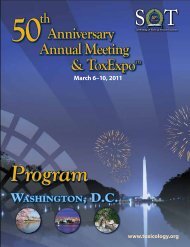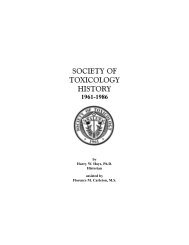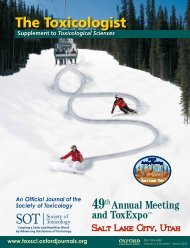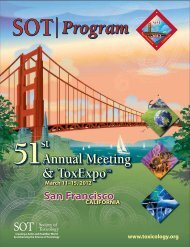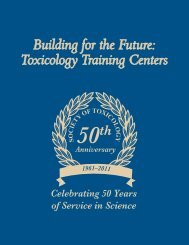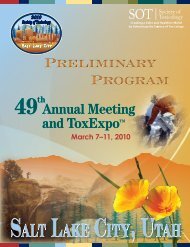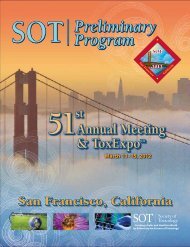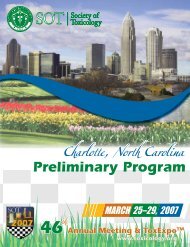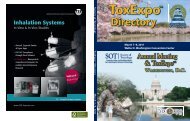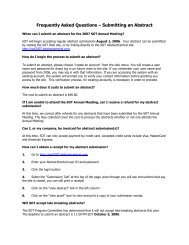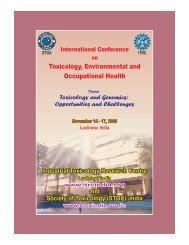Program - Society of Toxicology
Program - Society of Toxicology
Program - Society of Toxicology
You also want an ePaper? Increase the reach of your titles
YUMPU automatically turns print PDFs into web optimized ePapers that Google loves.
44 th Annual Meeting<br />
and ToxExpo<br />
Continuing Education<br />
IMMUNOLOGY FOR TOXICOLOGISTS<br />
AM 05<br />
BASIC<br />
Chairperson(s): Ian Kimber, Syngenta Central <strong>Toxicology</strong> Laboratory,<br />
Macclesfield,Cheshire, United Kingdom and Dori R. Germolec, National<br />
Institute for Environmental Health Sciences, Research Triangle Park, NC.<br />
Endorsed by:<br />
Immunotoxicology SS*<br />
Risk Assessment SS<br />
The adaptive immune system that is found in mammals comprises a dedicated<br />
interacting system <strong>of</strong> tissues, cells and molecules that work in concert to provide<br />
specific immune responses and host resistance to pathogenic microorganisms<br />
and transformed cells. Specific immunity is supplemented by, and works in<br />
harmony with, the phylogenetically more ancient innate immune system.<br />
Immunotoxicology describes the study <strong>of</strong> adverse health effects that may result<br />
from the interaction <strong>of</strong> xenobiotics with one or more components <strong>of</strong> the immune<br />
system. Such health effects may take a variety <strong>of</strong> forms. These include frank<br />
immunotoxicity where there is functional impairment <strong>of</strong> the immune system.<br />
The concern here is that compromised immune function may translate into an<br />
increased susceptibility to infectious and/or malignant disease. A second potential<br />
consequence <strong>of</strong> the interaction <strong>of</strong> chemicals or proteins with the immune<br />
system is allergy; defined as the adverse health effects that may arise from the<br />
stimulation <strong>of</strong> a specific immune response. Allergic disease may take a variety<br />
<strong>of</strong> forms, those <strong>of</strong> greatest significance for toxicologists being skin sensitization<br />
and allergic contact dermatitis, allergic sensitization <strong>of</strong> the respiratory tract,<br />
food allergy and idiosynctratic allergic drug reactions. Finally, xenobiotics have<br />
been implicated in the induction or exacerbation <strong>of</strong> autoimmune reactions and<br />
autoimmune disease. This course will provide a grounding in fundamental and<br />
clinical aspects <strong>of</strong> immunology, and will describe the basic elements immunotoxicity,<br />
allergy and autoimmunity. The objective is deliver an accessible guide<br />
to the immune system and immunotoxicology for general toxicologists.<br />
• An Introduction to Immunology: Fundamental and Clinical Aspects,<br />
Ian Kimber, Syngenta Central <strong>Toxicology</strong> Laboratory, Macclesfield,<br />
Cheshire, United Kingdom.<br />
• Elementary Immunotoxicology, Robert House, DynPort Vaccine<br />
Company, Frederick, MD.<br />
• Allergy and Allergic Disease, MaryJane Selgrade, U.S. EPA, Research<br />
Triangle Park, NC.<br />
• Autoimmunity and Autoimmune Disease, Dori R. Germolec, National<br />
Institute for Environmental Health Sciences, Research Triangle Park, NC.<br />
EVALUATION OF CARDIAC DRUG TOXICITY IN<br />
PHARMACEUTICAL DISCOVERY AND DEVELOPMENT<br />
AM 06 (REPEATS AS PM 12)<br />
BASIC<br />
Chairperson(s): Brian Short, Allergan, Irvine, CA and Y. J. Kang, University<br />
<strong>of</strong> Louisville, Louisville, KY.<br />
Endorsed by:<br />
Comparative and Veterinary SS<br />
HESI Biomarkers Technical Committee<br />
Mechanisms SS<br />
Regulatory and Safety Evaluation SS<br />
Student Advisory Committee<br />
Toxicologic and Exploratory Pathology SS<br />
The heart is an important potential target organ to evaluate in nonclinical and<br />
clinical studies during drug development as well as a therapeutic site <strong>of</strong> action<br />
for many cardiovascular diseases. There are examples in almost every therapeutic<br />
class <strong>of</strong> drugs that produced unanticipated cardiotoxicity leading to<br />
market withdrawal or cessation <strong>of</strong> development. Toxicologists are an integral<br />
part <strong>of</strong> an interdisciplinary group, including physiologists, pharmacologists,<br />
pathologists, clinicians, and regulators, which assess cardiac safety. As such,<br />
toxicologists play a critical role in the screening <strong>of</strong> pharmaceutical agents for<br />
cardiotoxicity as well as in establishing an adequate margin <strong>of</strong> safety and<br />
working basis for monitoring therapeutic endpoints and clinical safety <strong>of</strong> trial<br />
participants. The goal <strong>of</strong> this continuing education course is to illustrate the integration<br />
<strong>of</strong> physiology, pharmacology, toxicology, and pathology <strong>of</strong> the heart<br />
addressing both recent scientific advances and practical knowledge in pharmaceutical<br />
company setting. This course will cover in vitro and in vivo models <strong>of</strong><br />
drug-induced cardiac injury and recent advances in biomarkers <strong>of</strong> cardiac injury<br />
to improve the strategy for detection and nonclinical and clinical monitoring <strong>of</strong><br />
drug-related cardiotoxicity. This CE course will provide current understanding<br />
<strong>of</strong> the physiology <strong>of</strong> the heart with a focus on normal and drug-induced disturbances<br />
in cardiac electrophysiology and cardiac function, as well as testing<br />
strategies for assessing potential cardioactive drug candidates prior to entry into<br />
clinical trials. It will also cover basic and advanced knowledge <strong>of</strong> pathology <strong>of</strong><br />
the heart, including a review <strong>of</strong> cardiac pathological evaluation, and provide<br />
case examples <strong>of</strong> the integration <strong>of</strong> physiological and pathological parameters<br />
and risk assessment to humans. Biochemical, cellular and molecular mechanisms<br />
<strong>of</strong> cardiac toxicity, including recent work in experimental animal studies<br />
and novel approaches directed toward understanding mechanisms <strong>of</strong> druginduced<br />
cardiac injury, cardiomyopathy and cardiac hypertrophy will be<br />
presented. Finally, biomarkers <strong>of</strong> drug-induced cardiac injury will be discussed.<br />
This will include a review <strong>of</strong> the findings <strong>of</strong> the Expert Working Group on<br />
Biomarkers <strong>of</strong> Drug-Induced Cardiac Toxicity, an in-depth look at serum<br />
troponins, and related work currently in progress under the ILSI-sponsored<br />
Subcommittee on the Development and Application <strong>of</strong> Biomarkers <strong>of</strong> Toxicity.<br />
• Physiological Basis for Cardiac Drug Toxicity and Evaluation, Robyn L.<br />
Phelps, Allergan, Irvine, CA.<br />
• Integrating Cardiac Pathology into Drug Discovery and Development,<br />
Calvert Louden, AstraZeneca Pharmaceuticals, Wilmington, DE.<br />
• Mechanisms <strong>of</strong> Drug-Induced Cardiotoxicity, Y. J. Kang, University <strong>of</strong><br />
Louisville, Louisville, KY.<br />
• Biomarkers <strong>of</strong> Drug-Induced Cardiac Toxicity, Malcolm J. York,<br />
GlaxoSmithKline, Ware, Hertfordshire, United Kingdom.<br />
CE<br />
up-to-date information at www.toxicology.org 41



